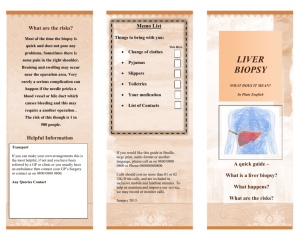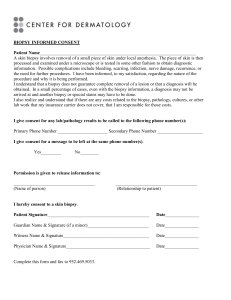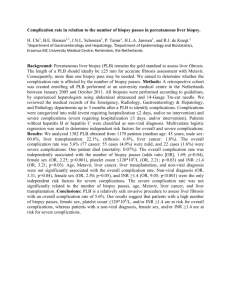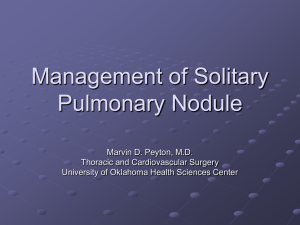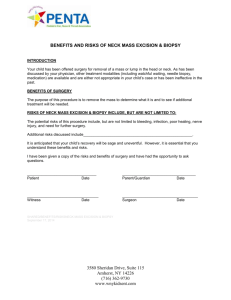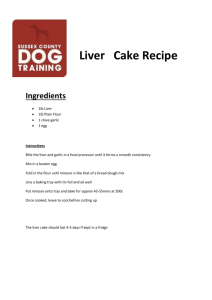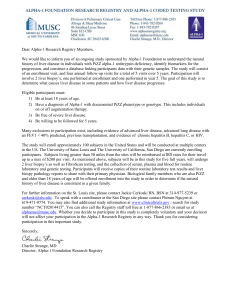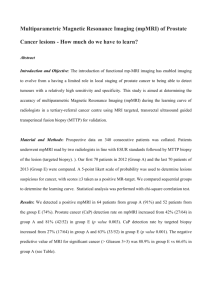Liver Biopsy
advertisement
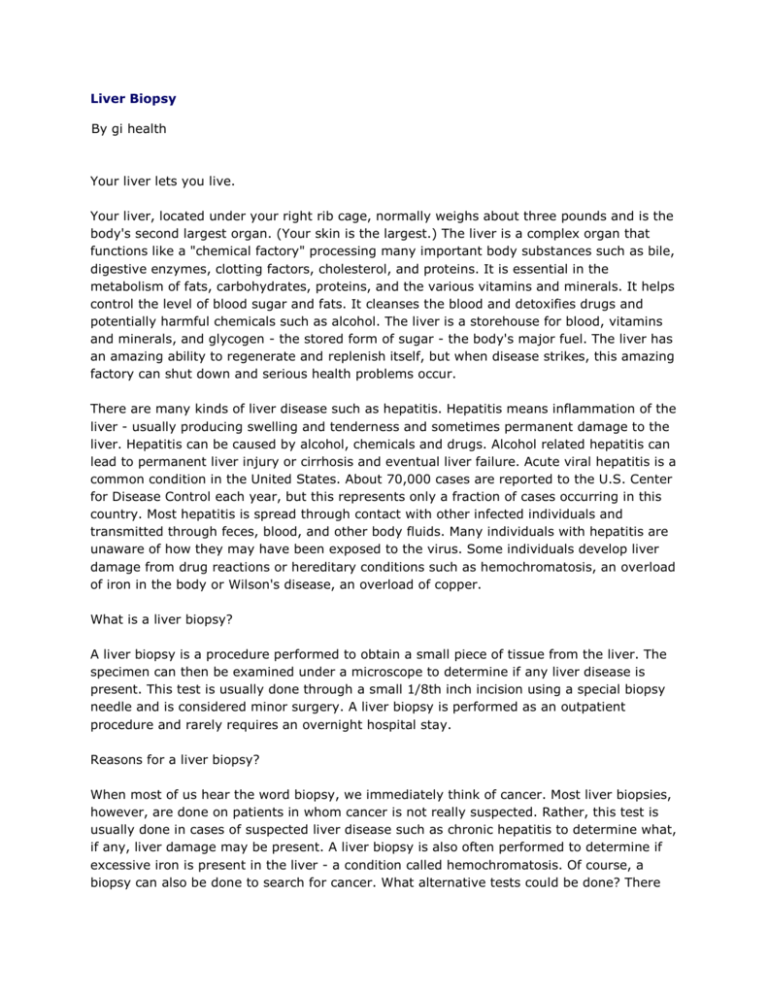
Liver Biopsy By gi health Your liver lets you live. Your liver, located under your right rib cage, normally weighs about three pounds and is the body's second largest organ. (Your skin is the largest.) The liver is a complex organ that functions like a "chemical factory" processing many important body substances such as bile, digestive enzymes, clotting factors, cholesterol, and proteins. It is essential in the metabolism of fats, carbohydrates, proteins, and the various vitamins and minerals. It helps control the level of blood sugar and fats. It cleanses the blood and detoxifies drugs and potentially harmful chemicals such as alcohol. The liver is a storehouse for blood, vitamins and minerals, and glycogen - the stored form of sugar - the body's major fuel. The liver has an amazing ability to regenerate and replenish itself, but when disease strikes, this amazing factory can shut down and serious health problems occur. There are many kinds of liver disease such as hepatitis. Hepatitis means inflammation of the liver - usually producing swelling and tenderness and sometimes permanent damage to the liver. Hepatitis can be caused by alcohol, chemicals and drugs. Alcohol related hepatitis can lead to permanent liver injury or cirrhosis and eventual liver failure. Acute viral hepatitis is a common condition in the United States. About 70,000 cases are reported to the U.S. Center for Disease Control each year, but this represents only a fraction of cases occurring in this country. Most hepatitis is spread through contact with other infected individuals and transmitted through feces, blood, and other body fluids. Many individuals with hepatitis are unaware of how they may have been exposed to the virus. Some individuals develop liver damage from drug reactions or hereditary conditions such as hemochromatosis, an overload of iron in the body or Wilson's disease, an overload of copper. What is a liver biopsy? A liver biopsy is a procedure performed to obtain a small piece of tissue from the liver. The specimen can then be examined under a microscope to determine if any liver disease is present. This test is usually done through a small 1/8th inch incision using a special biopsy needle and is considered minor surgery. A liver biopsy is performed as an outpatient procedure and rarely requires an overnight hospital stay. Reasons for a liver biopsy? When most of us hear the word biopsy, we immediately think of cancer. Most liver biopsies, however, are done on patients in whom cancer is not really suspected. Rather, this test is usually done in cases of suspected liver disease such as chronic hepatitis to determine what, if any, liver damage may be present. A liver biopsy is also often performed to determine if excessive iron is present in the liver - a condition called hemochromatosis. Of course, a biopsy can also be done to search for cancer. What alternative tests could be done? There are many ways to test the liver including blood tests, sonograms, and x-rays. However, the most accurate way to assess damage to liver cells is to perform a biopsy and directly examine the liver cells under a microscope. What are the risks? All surgical procedures involve some risk. Fortunately, the risk of liver biopsy is generally small. Possible complications include pain, internal bleeding, infection, and puncture of an internal organ such as a lung or the gallbladder. Fortunately, these complications are uncommon. To minimize these risks, the biopsy is done by a trained physician using sterile technique after first checking that tests of blood clotting are acceptable. How do I prepare for a liver biopsy? There is very little preparation for a liver biopsy. First, blood tests must be done to be sure the blood clotting function is acceptable for a safe biopsy. If you are on prescription drugs that affect clotting such as Coumadin, Plavix, Ticlid, Persantine, or Aggrenox, tell your doctor before your biopsy is scheduled. Also, since aspirin reduces clotting function, it is best that you avoid aspirin products and NSAIDS, such as Ibuprofen and Indomethacin, for at least a week before your biopsy. Tylenol does not alter blood clotting and is safe. You will need to fast after midnight. If you are a diabetic, do not take your morning insulin or any pills prescribed for your diabetes. Your biopsy will be scheduled in the early morning. An appointment will be scheduled at the local hospital outpatient surgery department. You must arrive about an hour before the biopsy and come fasting. You may take all your normal medications except insulin, oral diabetic agents, and blood thinners as described above. You will not be able to drive home so a driver must either accompany you or be available at the time of discharge, about 6 hours later. You must plan to go directly home after the biopsy. You will not be able to work or drive a car that day. You should avoid any heavy exertion and vigorous exercise for about a week. What is involved? About the size of a football, your liver is located under your right rib cage. A liver biopsy is usually performed right in your bed in the outpatient surgery department. After answering all of your questions, you will be asked to sign an informed consent form that gives your doctor permission to perform the biopsy. Sometimes, an ultrasound or CT scan is used to determine the best spot for liver biopsy. Your right side will be cleansed with an iodine antiseptic solution. A numbing anesthetic medication will then be injected in the location where the biopsy will be performed. If you are allergic to Novocaine or Lidocaine, be sure to tell your doctor before the biopsy begins. Once the area is numb, a small incision will be made in the skin. Using a special needle, your doctor will obtain one or more small cores of tissue from the liver. During each pass of the needle, you will be asked to hold your breath for about 10 seconds. Most patients report a brief feeling of discomfort during the biopsy but not severe pain. What can I expect after my biopsy? After a liver biopsy, you will be asked to remain in the recovery room for several hours to be observed for any post-biopsy complications. Serious complications are rare, but most patients will have some soreness at the biopsy site when the local anesthetic wears off. Irritation of the diaphragm muscle which lies over the liver can also cause some patients mild discomfort in their right shoulder. This soreness usually subsides in a few hours or days. If you notice any severe abdominal, chest, or shoulder pain in the week after your liver biopsy, contact your doctor. Minor soreness can usually be treated with Tylenol. To lessen the risk of bleeding, do not take any aspirin or ibuprofen products for one week after a liver biopsy. If you take prescription "blood thinners," ask your doctor for instructions. What if a complication does occur? Should a serious complication occur, you will be admitted to the hospital. This would usually mean a few days of further observation and medical treatment, but could mean an operation to treat internal complications. Again, such complication are quite rare. How do I get the results of my biopsy? After a liver biopsy, the specimen is sent to the hospital pathology laboratory where the tissue must undergo special processing and examination. The slides are then examined by a doctor trained in reading biopsies - a pathologist. A report will be sent to the doctor who performed the biopsy. This will take about a week - longer if special stains are needed. Your doctor will then contact you with the results of the biopsy and plans for treatment if necessary.

